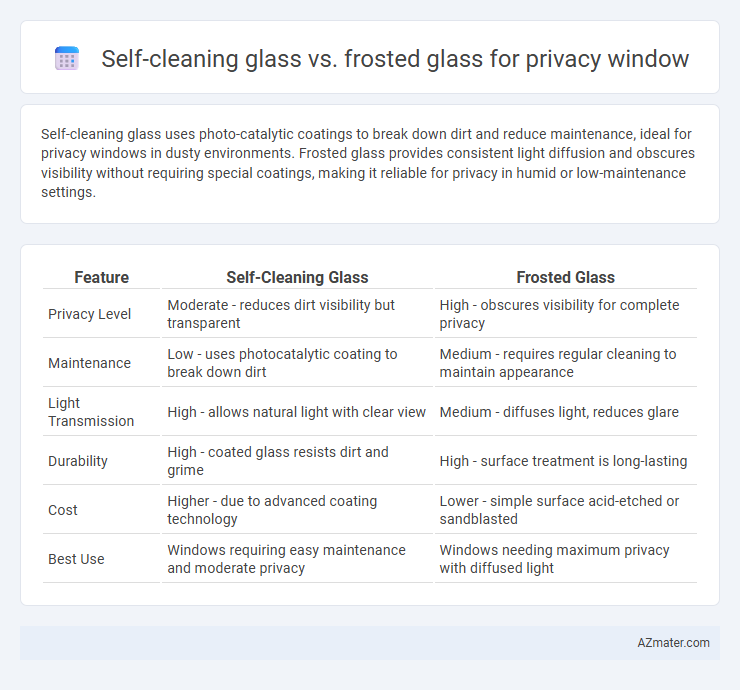Self-cleaning glass uses photo-catalytic coatings to break down dirt and reduce maintenance, ideal for privacy windows in dusty environments. Frosted glass provides consistent light diffusion and obscures visibility without requiring special coatings, making it reliable for privacy in humid or low-maintenance settings.
Table of Comparison
| Feature | Self-Cleaning Glass | Frosted Glass |
|---|---|---|
| Privacy Level | Moderate - reduces dirt visibility but transparent | High - obscures visibility for complete privacy |
| Maintenance | Low - uses photocatalytic coating to break down dirt | Medium - requires regular cleaning to maintain appearance |
| Light Transmission | High - allows natural light with clear view | Medium - diffuses light, reduces glare |
| Durability | High - coated glass resists dirt and grime | High - surface treatment is long-lasting |
| Cost | Higher - due to advanced coating technology | Lower - simple surface acid-etched or sandblasted |
| Best Use | Windows requiring easy maintenance and moderate privacy | Windows needing maximum privacy with diffused light |
Introduction: Choosing the Right Privacy Window
Self-cleaning glass incorporates a special coating that breaks down organic dirt and repels water, reducing maintenance while maintaining clear visibility. Frosted glass uses acid-etching or sandblasting techniques to create a translucent surface that obscures views, enhancing privacy without sacrificing natural light. Selecting between these options depends on balancing the need for easy upkeep with the desired level of visual privacy in your space.
What is Self-Cleaning Glass?
Self-cleaning glass features a special coating that uses sunlight to break down organic dirt and rainwater to wash it away, reducing maintenance and enhancing visibility. Unlike frosted glass, which obscures vision by creating a translucent surface, self-cleaning glass maintains clarity while keeping the window clean. This technology is ideal for privacy windows where clear, low-maintenance glass is preferred without sacrificing natural light.
What is Frosted Glass?
Frosted glass is a type of privacy glass created by sandblasting or acid etching clear glass to produce a translucent, matte finish that obscures visibility while allowing light to pass through. It is commonly used in privacy windows, bathrooms, and office partitions to maintain natural light without compromising privacy. Unlike self-cleaning glass, frosted glass does not possess any special coating to reduce dirt or water spots but excels in diffusing light and preventing clear views through the glass.
Privacy Levels: Self-Cleaning Glass vs Frosted Glass
Self-cleaning glass offers minimal privacy as it is transparent and primarily designed to reduce maintenance by breaking down organic dirt using a photocatalytic coating. Frosted glass provides high privacy levels by diffusing light and obscuring visibility, making it ideal for spaces requiring discreetness such as bathrooms or office partitions. When privacy is a priority, frosted glass is the superior choice compared to the clear nature of self-cleaning glass.
Maintenance and Cleaning Requirements
Self-cleaning glass utilizes a photocatalytic coating that breaks down organic dirt and a hydrophilic surface that allows rainwater to wash away debris, significantly reducing manual cleaning frequency and effort. Frosted glass, while providing excellent privacy, typically requires regular cleaning with standard glass cleaners to prevent buildup of dust and fingerprints, as it lacks any self-cleaning properties. Maintenance of self-cleaning glass is minimal compared to frosted glass, making it more cost-effective and convenient for long-term use in privacy windows.
Light Transmission and Aesthetic Appeal
Self-cleaning glass offers high light transmission, typically above 80%, allowing natural light to illuminate spaces while reducing maintenance needs due to its innovative titanium dioxide coating that breaks down organic dirt. Frosted glass provides moderate light diffusion, around 40-60% light transmission, creating privacy without completely blocking daylight, with a matte finish that softens glare and enhances contemporary aesthetics. The choice between self-cleaning and frosted glass balances the desire for bright, low-maintenance environments against discreet, softly lit privacy solutions with distinct visual textures.
Cost Comparison and Installation Differences
Self-cleaning glass generally costs 20-30% more than frosted glass due to its advanced titanium dioxide coating technology that breaks down dirt and reduces maintenance, while frosted glass is a more affordable option with a simpler installation process involving etching or film application. Installation of self-cleaning glass often requires professional handling to maintain the integrity of the coating and ensure proper function, whereas frosted glass can often be installed by standard glazing technicians or DIY methods with less risk of damage. Cost savings on maintenance and cleaning over time make self-cleaning glass a valuable investment despite higher upfront expenses, while frosted glass provides a cost-effective privacy solution with lower initial costs but potentially higher upkeep.
Durability and Longevity
Self-cleaning glass offers enhanced durability due to its protective titanium dioxide coating, which resists dirt and reduces maintenance over time, extending the glass's lifespan. Frosted glass, while providing consistent privacy through its permanent textured surface, may be prone to scratches and staining, potentially affecting its long-term appearance. The longevity of self-cleaning glass surpasses frosted glass in environments with high pollution or frequent exposure to dirt, making it a more durable option for privacy windows.
Energy Efficiency and Environmental Impact
Self-cleaning glass enhances energy efficiency by reducing the need for manual cleaning, which lowers water and chemical usage, thereby minimizing environmental impact. Frosted glass provides constant privacy without compromising insulation, improving thermal performance and reducing heating and cooling energy consumption. Choosing self-cleaning glass promotes sustainability through less frequent maintenance and fewer cleaning agents, while frosted glass contributes to energy conservation with its natural light diffusion and heat retention properties.
Best Applications: Which Glass is Right for You?
Self-cleaning glass is ideal for exterior windows in hard-to-reach areas, offering low maintenance and continuous cleanliness by breaking down organic dirt with sunlight and rain. Frosted glass provides consistent privacy by diffusing light and obscuring visibility, making it perfect for interior rooms, bathrooms, and office partitions. Choosing between the two depends on whether ease of cleaning or maximum visual privacy is the primary need for your space.

Infographic: Self-cleaning glass vs Frosted glass for Privacy window
 azmater.com
azmater.com